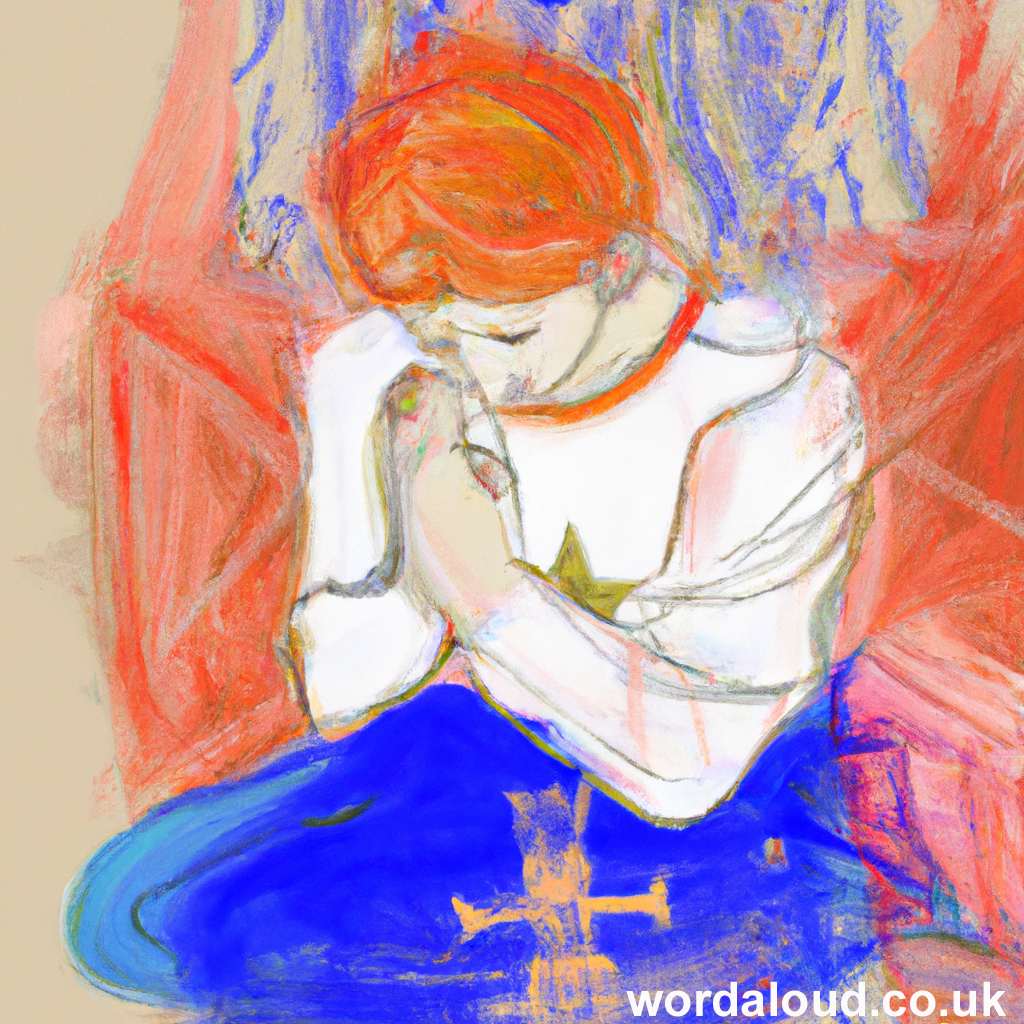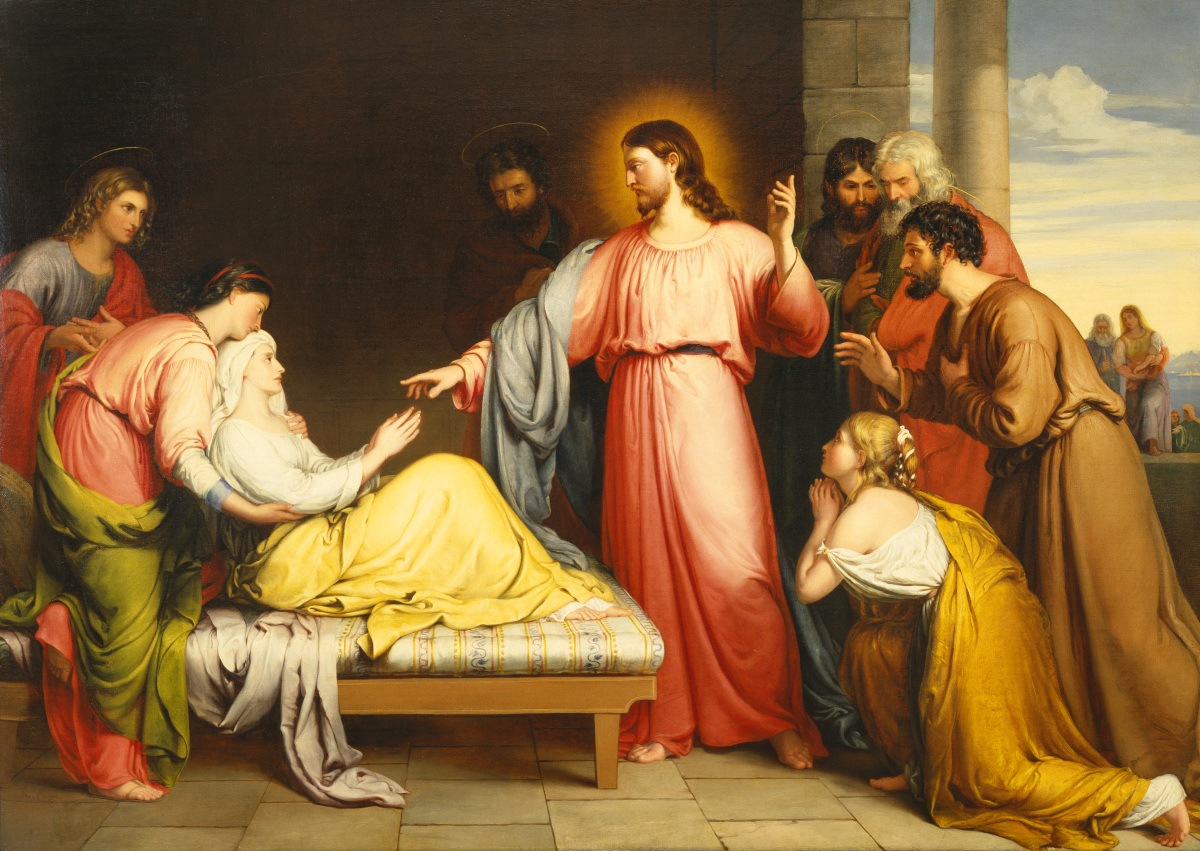Christian Art | Destruction Of The Temple AD 70 | Great Tribulation In Jerusalem | Apocalypse
Luke 21: 20-28 – Week 34 Ordinary Time, Thursday (Audio Bible KJV, Spoken Word)
20 And when ye shall see Jerusalem compassed with armies, then know that the desolation thereof is nigh.
21 Then let them which are in Judæa flee to the mountains; and let them which are in the midst of it depart out; and let not them that are in the countries enter thereinto.
22 For these be the days of vengeance, that all things which are written may be fulfilled.
23 But woe unto them that are with child, and to them that give suck, in those days! for there shall be great distress in the land, and wrath upon this people.
24 And they shall fall by the edge of the sword, and shall be led away captive into all nations: and Jerusalem shall be trodden down of the Gentiles, until the times of the Gentiles be fulfilled.
25 ¶ And there shall be signs in the sun, and in the moon, and in the stars; and upon the earth distress of nations, with perplexity; the sea and the waves roaring;
26 Men’s hearts failing them for fear, and for looking after those things which are coming on the earth: for the powers of heaven shall be shaken.
27 And then shall they see the Son of man coming in a cloud with power and great glory.
28 And when these things begin to come to pass, then look up, and lift up your heads; for your redemption draweth nigh.
The Christians living in Jerusalem wanted no part of the Jewish Rebellion and, remembering Jesus’ prophecy, fled Jerusalem as the Romans advanced. They avoided the slaughter, and for this there arose enmity between Christians and those Jews who adhered to the old Law. There was a parting of the ways. The Jews went to rebuild their religion, led by the Pharisees and along exclusive lines, never more to be centred on Temple worship. The Jewish Christian Church which had been in Jerusalem waned – the Temple had been of great importance to Jerusalem Christians also. Henceforth, the Church would become more and more of the Gentiles.
Between the destruction of Jerusalem and Jesus’ second coming, the parousia, the ‘times of the Gentiles’ must be fulfilled. In listening to these verses, there is a curious literary effect. The ‘times of the Gentiles’ have lasted through all subsequent history – the physical end of the world didn’t happen, and it’s clear from the Gospels as a whole that Jesus didn’t intend to mean that it would – and this age, these times, may well stretch billions of years from now into the future before our universe ends. In other words, there’s a lot of time, a lot of history, included here.
For all that, that great sweep of time is expressed in a brief, and potentially ambiguous, clause tacked onto the end of an intense and highly developed descriptive passage – we could almost miss it as we pass from one scene of localized carnage to scenes of global and cosmic upheaval. As we listen to the verses, the account of the destruction of Jerusalem seems to flow into the time of the coming of the Son of man. Our sense of these scenes is that, no matter the intervening time we are told about, they really are of a piece. Jesus will reinforce this way of hearing the verses when he goes on to say: ‘Verily I say unto you, This generation shall not pass away, till all be fulfilled.’ (Verse 32)
It seems, then, that we have to understand the coming of the Son of man as something additional to Christ’s coming again to judge the living and the dead at the end of the world. The language of apocalypse (revelation) is intended to be more than literal. It is an intense, heightened language, to signify the great renewal, the overhauling of our lives, as Christ comes to us. This intense visionary experience can happen now.
13 I saw in the night visions, and, behold, one like the Son of man came with the clouds of heaven, and came to the Ancient of days, and they brought him near before him.
14 And there was given him dominion, and glory, and a kingdom, that all people, nations, and languages, should serve him: his dominion is an everlasting dominion, which shall not pass away, and his kingdom that which shall not be destroyed. (Daniel 7: 13-14)
![]()

Audio Bible KJV | Endnotes | Parousia | Apocalypse
Destruction Of Jerusalem | Destruction Of The Temple
The destruction of Jerusalem in AD70 was a significant event in the history of the Jewish people and the Roman Empire. The event is often referred to as the First Jewish-Roman War or the Great Revolt, and it resulted in the destruction of the Second Temple, which was the centre of Jewish religious life.
The war began in AD66 when Jewish rebels revolted against the Roman Empire, which had been ruling over Judea since the reign of Julius Caesar. The immediate cause of the rebellion was the Roman governor’s decision to seize the Temple treasury to pay for a new aqueduct. However, the underlying causes were the long-standing tensions between the Jewish people and their Roman rulers, who were seen as oppressive and insensitive to Jewish religious and cultural values.
The initial success of the Jewish rebels was short-lived, as the Roman Empire, under the leadership of General Vespasian, launched a counter-attack in AD67. The Roman army quickly gained control of many of the major cities in Judea, including Jerusalem. However, the rebels continued to fight, and it took the Romans four years to finally subdue the rebellion.
In AD70, the Roman army, under the command of Vespasian’s son, Titus, laid siege to Jerusalem. The siege lasted for several months, and conditions inside the city grew increasingly desperate as food and water supplies ran low. In August of that year, the Romans finally breached the city walls and launched a fierce assault on the Temple Mount.
The Temple itself was burned and destroyed, and the surviving Jewish rebels were either killed or enslaved. The destruction of the Temple was a devastating blow to the Jewish people, as it was the center of their religious and cultural life. It was also a significant event in the history of the Roman Empire, as it marked the end of the First Jewish-Roman War and the consolidation of Roman power over Judea.
The destruction of Jerusalem and the Temple was a traumatic event for the Jewish people, and it had a profound impact on Jewish history and culture. The event is commemorated annually in the Jewish calendar with the fast day of Tisha B’Av, which is a day of mourning for the loss of the Temple and the tragedies that befell the Jewish people throughout history.
Roman Suppression Of The Jews
Following the destruction of the Temple, the Roman authorities began a systematic campaign to suppress Jewish resistance and repress Jewish cultural and religious practices. Many Jews were killed or forced into exile, and the Jewish population of Judea was greatly reduced.
The destruction of the Temple also had significant theological and religious implications for Judaism. Without a central sanctuary, Jewish worship and religious practice shifted towards the synagogue and the home. Rabbinic Judaism emerged as the dominant form of Judaism, which emphasized the study of the Torah and the observance of Jewish law.
The destruction of Jerusalem and the Temple also had political implications for the Roman Empire. The war and its aftermath exposed the weaknesses of Roman rule in the eastern Mediterranean and the challenges of ruling a culturally diverse and religiously complex region. It also contributed to the rise of the Flavian dynasty, as the success of the war brought prestige and power to the family of Vespasian and Titus.
Memory Of The Temple
In the centuries that followed, the memory of the destruction of the Temple remained a powerful symbol in Jewish history and culture. The Temple became a symbol of hope and longing for the restoration of Jewish sovereignty and the rebuilding of the Temple in Jerusalem. This hope and longing continue to shape Jewish religious and cultural practices to this day.
The destruction of the Temple and the events of the First Jewish-Roman War had significant implications for the development of Christianity as well. Jesus had predicted the destruction of the Temple in Luke 21:20-28, and many early Christian communities saw the event as a sign of God’s judgment and the end of the old covenant between God and Israel.
Destruction Of The Temple And Christian Worship
The destruction of the Temple also had practical implications for early Christian worship. Prior to the destruction of the Temple, many early Christian communities had continued to participate in Jewish worship practices, including sacrifices and offerings at the Temple. With the destruction of the Temple, these practices became impossible, and early Christian worship became more focused on the Eucharist and other sacraments.
The destruction of Jerusalem and the Temple also contributed to the spread of Christianity beyond its Jewish origins. With the destruction of the Temple and the suppression of Jewish resistance, many Jews began to turn away from their traditional religious practices and beliefs. This created an opportunity for Christianity to grow and spread, as it offered a new religious and cultural identity for those seeking an alternative to Judaism.
In summary, the destruction of Jerusalem in AD70 was a significant event in the history of the Jewish people, the Roman Empire, and Christianity. It marked the end of the First Jewish-Roman War, the destruction of the Temple, and the beginning of a new era in Jewish and Christian history. The memory of the destruction of the Temple continues to shape Jewish and Christian religious and cultural practices to this day, and it remains a powerful symbol of hope and longing for the restoration of God’s kingdom on earth.








